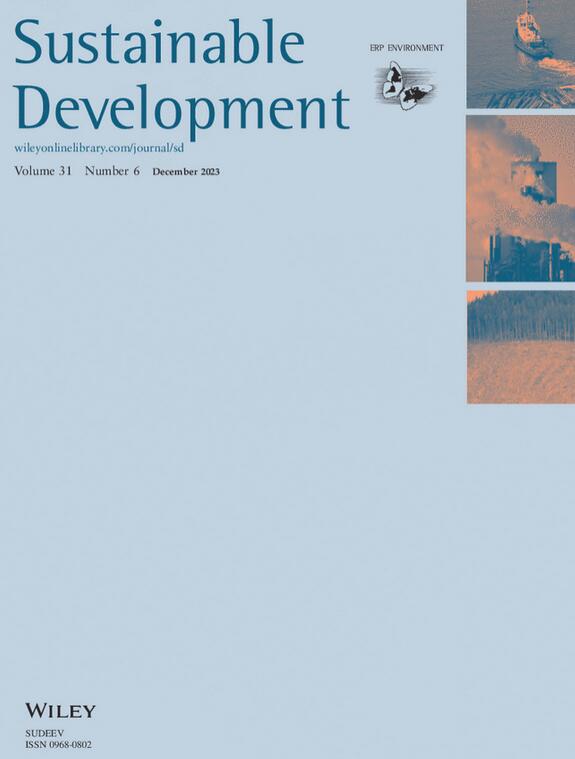绿色金融、绿色技术创新和制度质量是否有助于实现环境可持续性?来自发展中经济体的证据
IF 8.2
1区 环境科学与生态学
Q1 DEVELOPMENT STUDIES
引用次数: 0
摘要
实现可持续经济增长的一种可能途径是限制二氧化碳(CO 2)的排放。特别是对全球二氧化碳排放量贡献巨大的发展中国家,需要转变模式,转向可持续的生产和消费,以实现经济增长,同时确保环境的可持续性。因此,本研究分析了绿色技术创新、绿色金融、可再生能源使用、制度质量和农业增加值在通过减少二氧化碳排放实现环境可持续性方面的作用,选择了25个发展中国家从1998年到2019年。本研究使用Driscoll - Kraay和两步SGMM估计器来评估自变量对响应变量的影响,承认模型中的内生性问题。实证结果表明,绿色金融、绿色技术创新和制度质量对二氧化碳排放有促进作用,而农业增加值和可再生能源的使用对二氧化碳排放有不利影响。此外,绿色技术创新和制度质量与绿色金融的调节作用对co2排放的影响微弱且不显著。因此,该研究建议发展中国家执行政策,促进清洁能源领域的投资和创新,从而通过减少碳排放实现可持续发展目标。本文章由计算机程序翻译,如有差异,请以英文原文为准。
Do green finance, green technology innovation, and institutional quality help achieve environmental sustainability? Evidence from the developing economies
Abstract One possible way to achieve sustainable economic growth is by limiting carbon dioxide (CO 2 ) emissions. The developing countries, in particular, which significantly contribute to global carbon dioxide emissions, need a paradigm shift towards sustainable production and consumption to achieve economic growth while ensuring environmental sustainability. This study thus analyzes the role of green technology innovation, green finance, renewable energy use, institutional quality, and agricultural value added in attaining environmental sustainability by abating CO 2 emissions for 25 select developing countries from 1998 to 2019. This study uses the Driscoll‐Kraay and two‐step SGMM estimators to assess the impact of independent variables on the response variable, acknowledging the endogeneity problem in the model. The empirical findings reveal that green finance, green technology innovation, and institutional quality induce CO 2 emissions, whereas agricultural value‐added and renewable energy use are observed to have detrimental effects on CO 2 emissions. Moreover, the moderation effect of green technology innovation and institutional quality with green finance is observed to have a weak and insignificant impact on CO 2 emissions. The study thus recommends that developing countries enforce policies to promote investments and innovation in the clean energy sector to attain sustainable development goals by mitigating carbon emissions.
求助全文
通过发布文献求助,成功后即可免费获取论文全文。
去求助
来源期刊

Sustainable Development
Multiple-
CiteScore
17.30
自引率
11.20%
发文量
168
期刊介绍:
Sustainable Development is a publication that takes an interdisciplinary approach to explore and propose strategies for achieving sustainable development. Our aim is to discuss and address the challenges associated with sustainable development and the Sustainable Development Goals. All submissions are subjected to a thorough review process to ensure that our readers receive valuable and original content of the highest caliber.
 求助内容:
求助内容: 应助结果提醒方式:
应助结果提醒方式:


